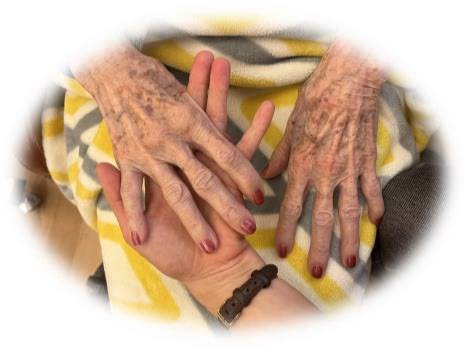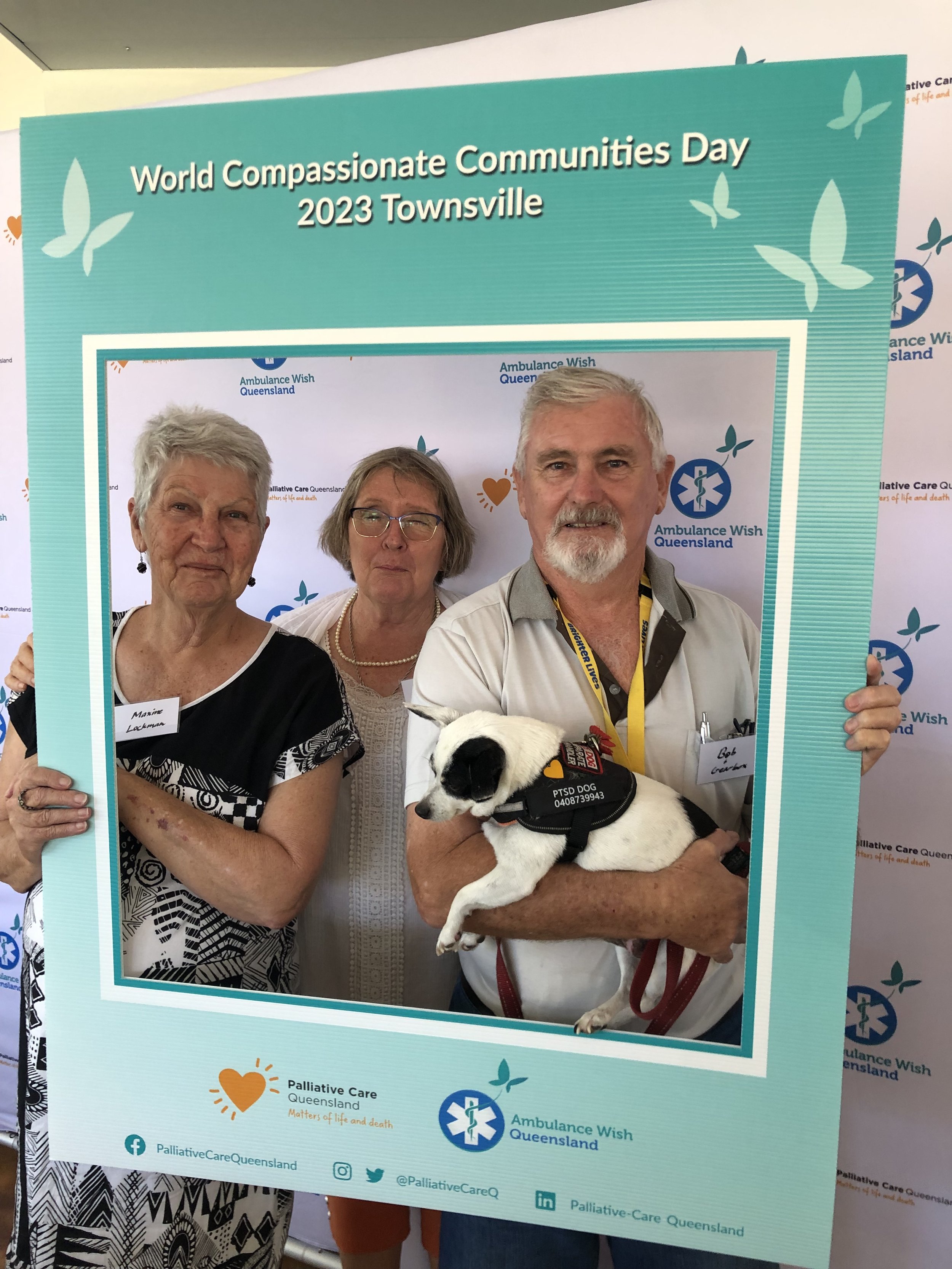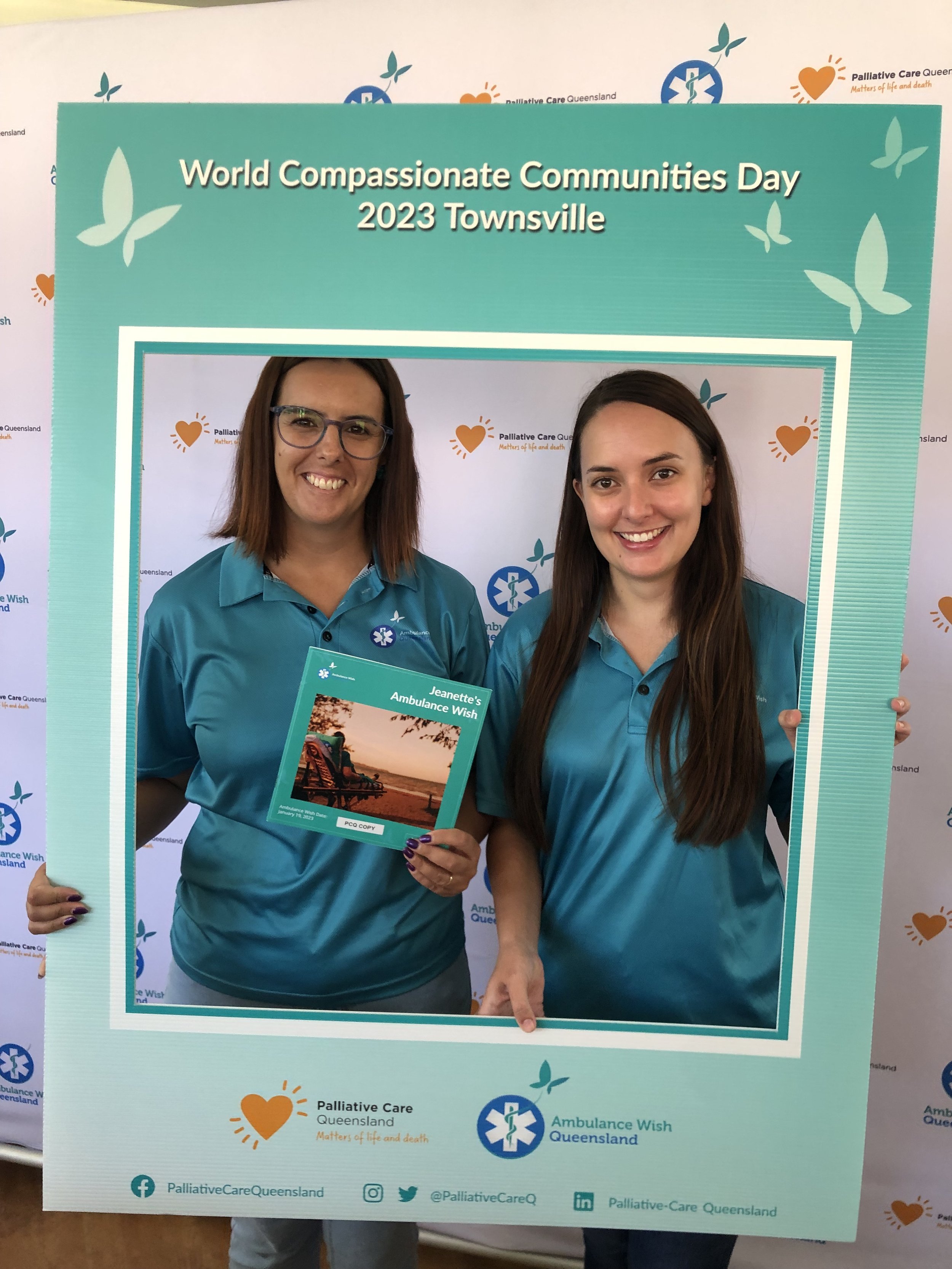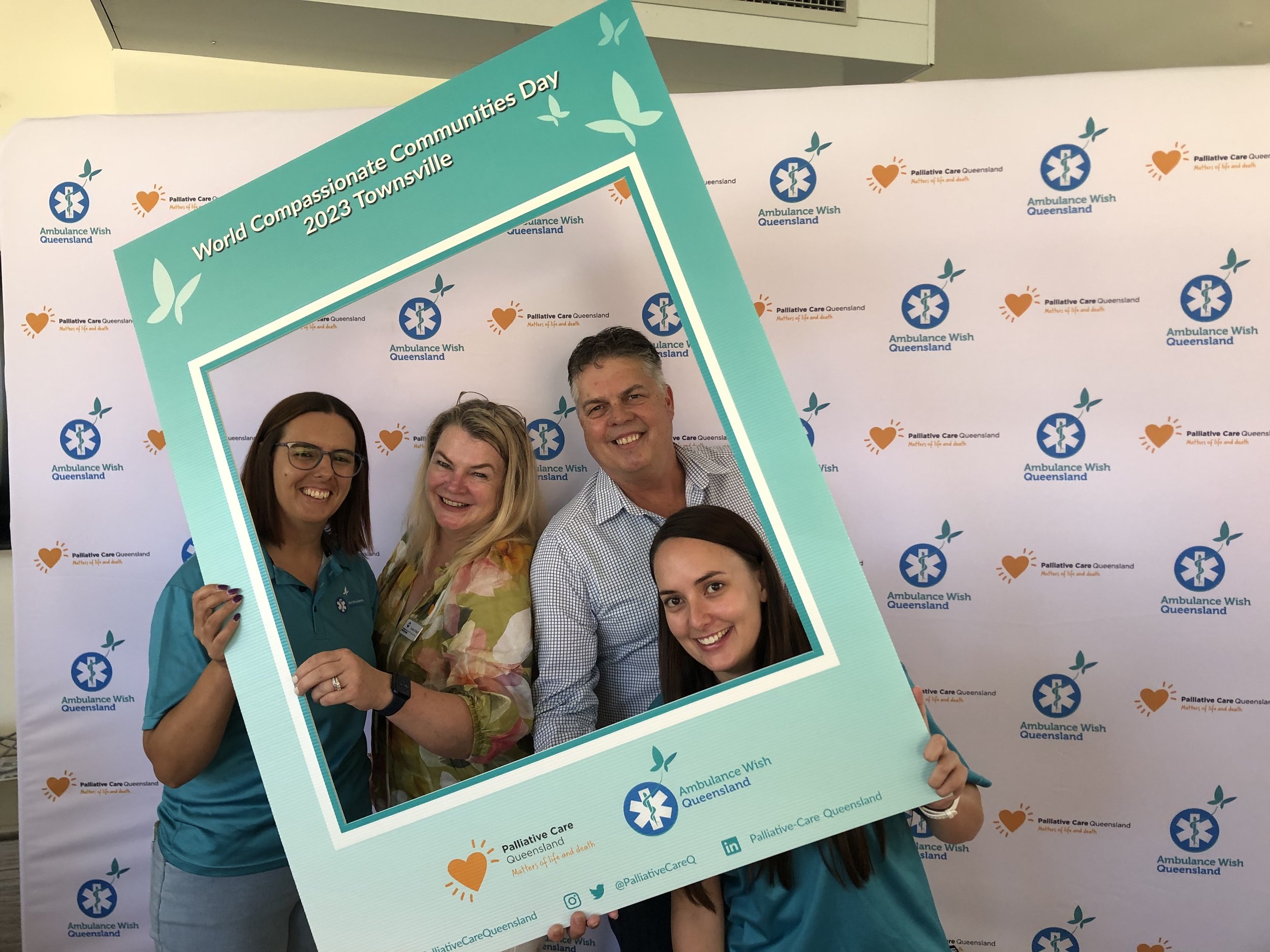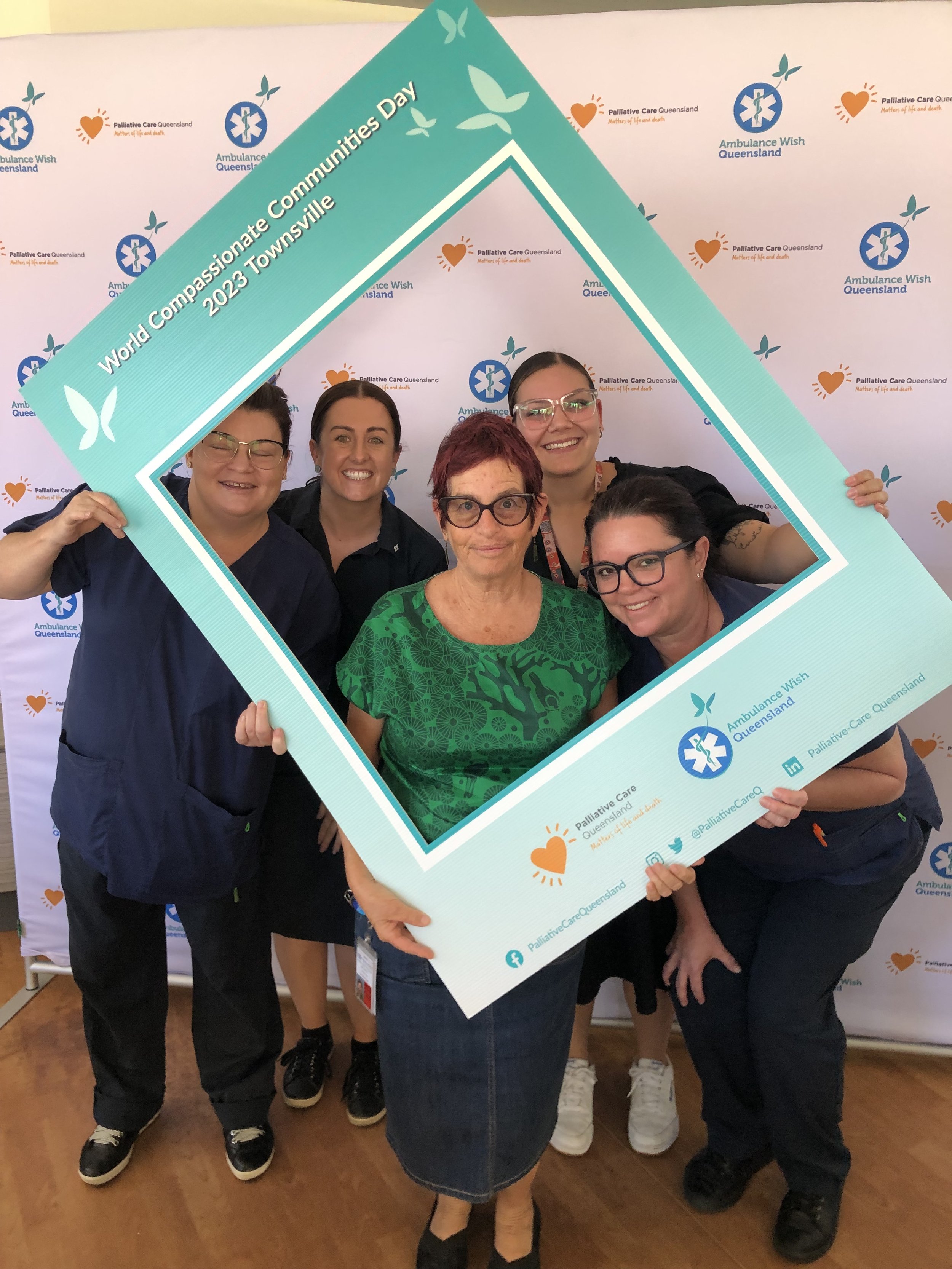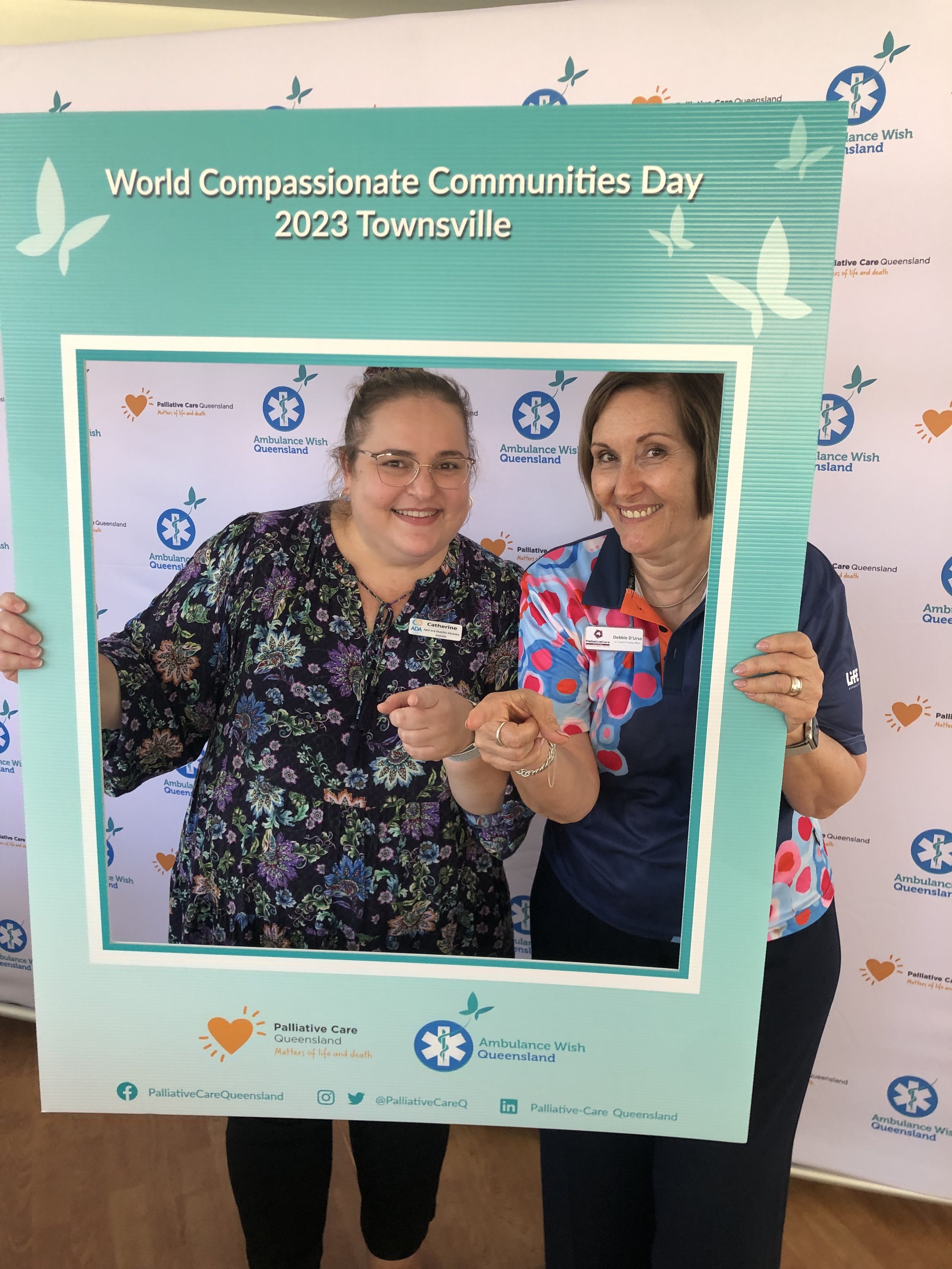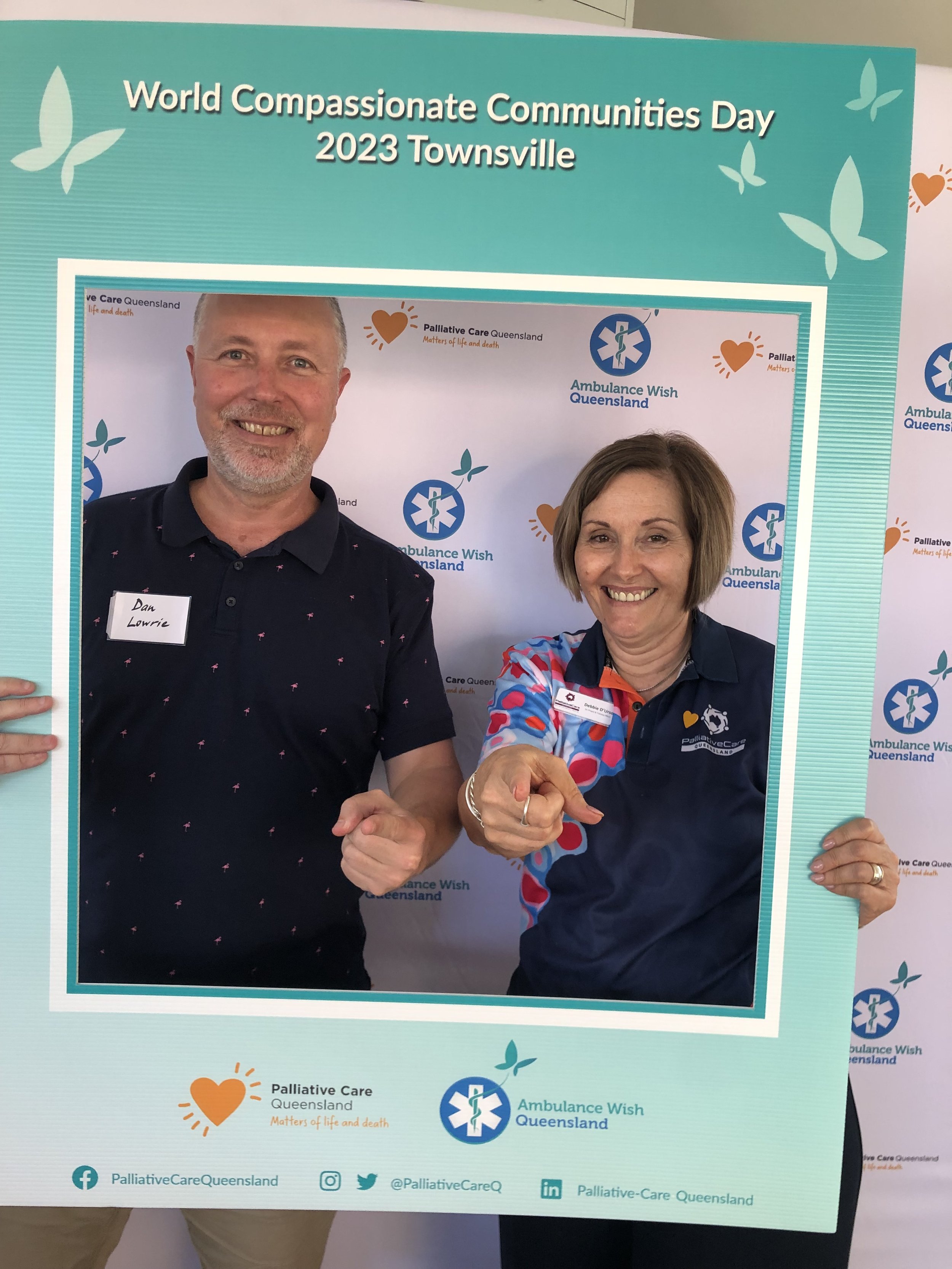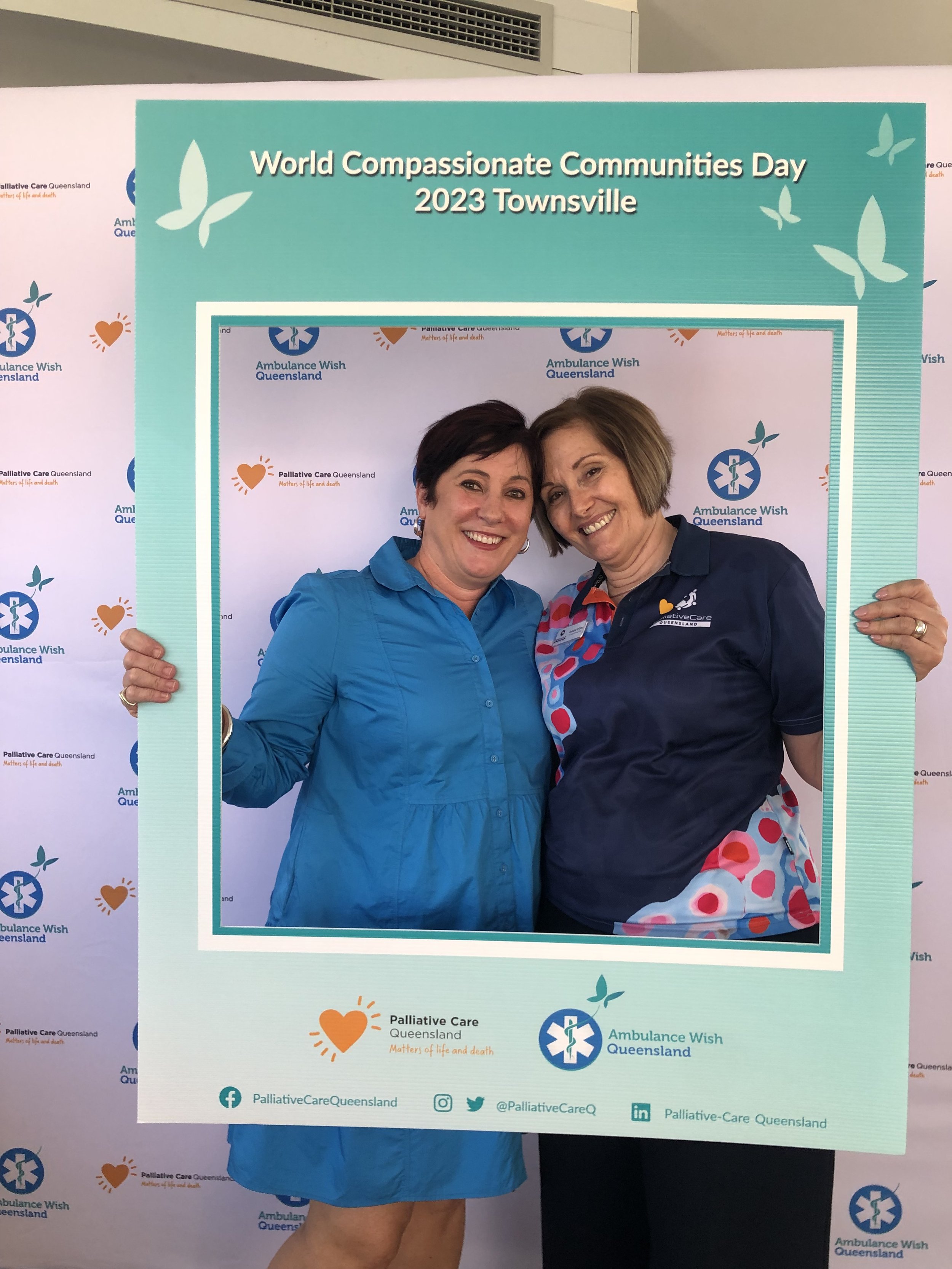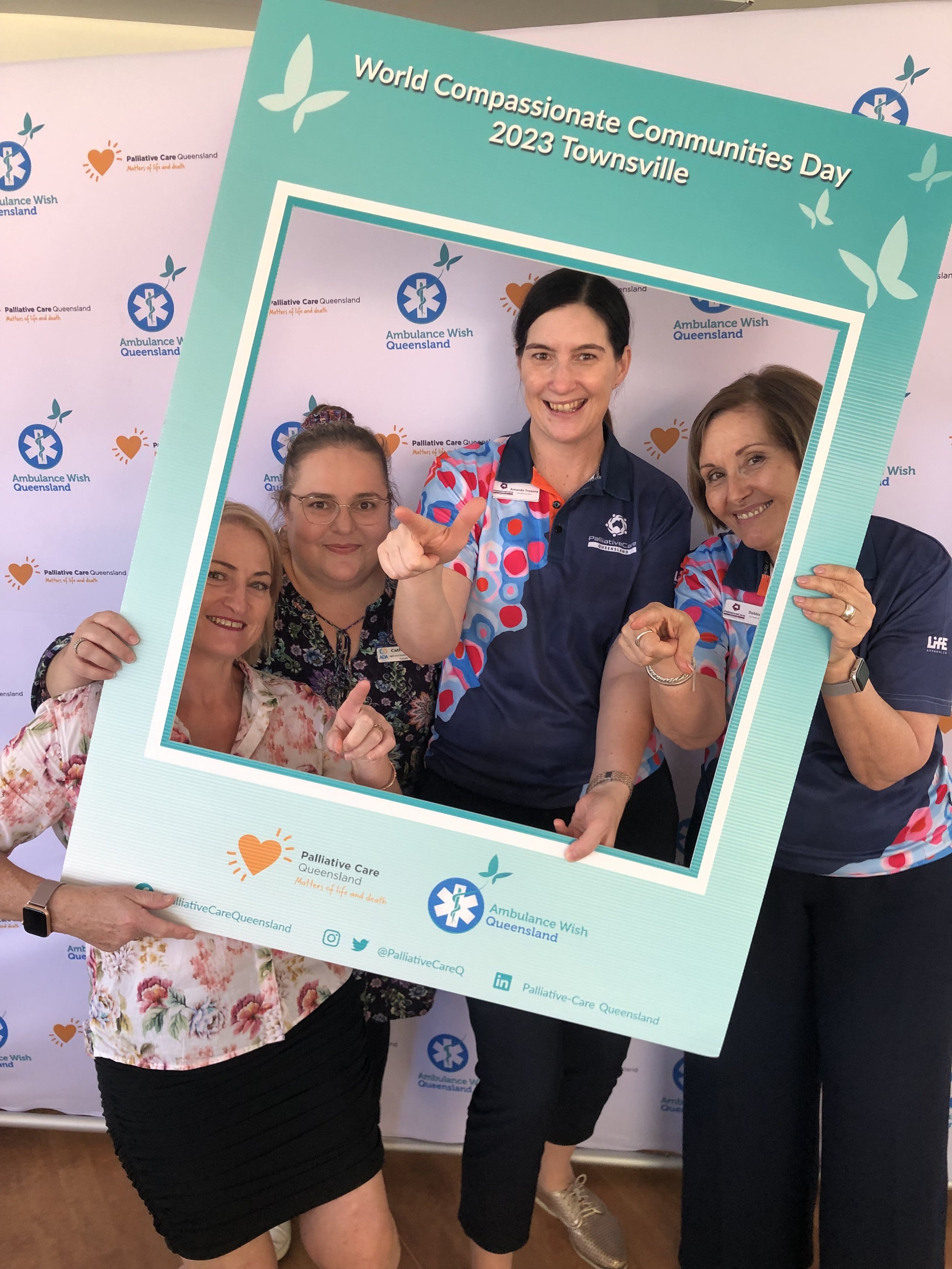World Compassionate Communities Day 2023
This year the Compassionate Communities (ComCom) movement will be highlighted by both Public Health Palliative Care International (PHPCI) and World Hospice and Palliative Care Alliance (WHPCA). This year’s WHPCA’s World Hospice and Palliative Care Day (WHPCD) theme is Compassionate Communities: Together for Palliative Care. The focus will be to increase the awareness of the Compassionate Communities movement and encourage those in the palliative care space to support their local Compassionate Community or increase the awareness of the movement within their community.
Therefore, following the awareness campaign by WHPCD, PHPCI would like to take this opportunity to share the learnings from the many Compassionate Community initiatives worldwide. This will be an opportunity for those engaging in the ComCom movement to share the great work and collaboration that has existed for several years within the PHPCI community.
We hope you will take this opportunity to participate and share your experience with supporting those in your community who are seriously ill, caregiving, dying, and/or grieving.
How to participate
1. Answer the following question - In my community, how do we support people who are seriously ill, caregiving, dying, and/or grieving?
*Things to think about when answering the questions
You can answer the question from your personal experience and/or from your group or organization's work in the ComCom space.
This submission does not need to be long; it could be a piece you posted on social media – we just want to share the great work and stories!
We want to highlight all work, big or small!
Share a picture that supports your answer.
It could be a picture of a gathering or an event.
Or share a quick video (two minutes or less) to share a learning.
2. Send an email to membership@phpci.org with the following information:
a. Your answer to the above question
b. Your name,
c. The country you live in
d. The name of the organization/group, if you are associated with one.
3. Keep sending your stories and examples in! We will update this page to include new examples that we receive up until World Compassionate Communities Day on Nov 1, 2023. We look forward to receiving and sharing your submissions so that we can collectively celebrate the importance and potential of compassionate communities.
Statement of Use
PHPCI will use the content you share on our PHPCI’s webpage for World Compassionate Communities Day (WCCD) on our social media platforms as a part of the WCCD event and may showcase your work on other PHPCI promotions around the Compassionate Communities movement. By sending us your answer to the question, you consent to PHPCI statement of use.
To see what others have shared, follow us on social media (X, Facebook, LinkedIn) or visit us on this page on, or in the lead up to, World Compassionate Communities Day on Nov 1, 2023.
shared learning for compassionate communities
Celebrating compassionate communities faciltator networks in thailand
Ekkapop Sittiwantana. Compassionate Communities Facilitator and Project Manager for the Peaceful Death Project, Compassionate Communities Research and Development Institution Foundation Thailand
My name is Ekkapop Sittiwantana. Compassionate Communities Facilitator and Project Manager for the Peaceful Death Project, Compassionate Communities Research and Development Institution Foundation Thailand. I'd like to share our little activity on World ComCom Day 2023.
We invited all ComCom facilitator networks to join a 90 minute online meeting late in the afternoon. Twenty-four people participated. The activities included a short introduction, sharing stories of each others' ComCom work as well as future goals from our areas and connecting to our passed loved ones who leave inspiration alongside group meditation. We also prayed for people who live with suffering, due to death dying, and loss from illness and war.
Participants reflected that they felt inspiration, connectedness, and learned about CoCo development strategies. We are sure that we will continue to hold these valuable meetings in future years.
Peaceful Death Project
Compassionate Communities Research and Development Institution Foundation Thailand
Thank you
Fulfilling last wishes and creating memories
Ambulance Wish Queensland in Partnership with Palliative Care Queensland, Australia
Ambulance Wish Queensland volunteers Michelle and Jamie in attendance at a World Compassionate Communities Day celebration, Townsville, Australia.
Ambulance Wish Queensland was modelled on charity programs in the Netherlands (Stichting Ambulance Wens) and the UK (Ambulance Wish Foundation UK). With the support of the Queensland Government and Palliative Care Queensland, Ambulance Wish Queensland provides people with life limiting conditions access to the planning, coordination, specialist transport and clinical care they need to fulfil their personal wishes. Goals will vary but can often be seemingly simple such as a visit to a favourite place, attendance at a much loved sporting event or even (as was the case with Betty, the first recipient of the support of Ambulance Wish Queensland) the chance to visit the botanical gardens and enjoy a passionfruit ice-cream.
All wishes are carried with the support of a professional ambulance crew, without whom they may not be safe or possible.
Today, on World Compassionate Communities Day, we celebrate the work of people who make dreams come true. We thank the team at Ambulance Wish Queensland and all those who work to fulfill the wishes and needs of dying persons and those who matter to them around the world.
The Healing Harbour
The Healing Harbour Charity, North Norfolk, England
Our Community group is based in North Norfolk, England. This is a geographically rural area of 65 neighbourhoods with a population of 102,979, a third of which are over 65 years of age. 6,212 people living in this area describe themselves as having ‘bad or very bad health’. There are just under 700 people registered with a GP as receiving palliative care, but sadly there were no compassionate community groups/organisations for palliative care in our area.
In September 2022, over 30 community members came together in response to an invitation to ‘create a Healing Garden in which people (and their families/carers) experiencing life-limiting illnesses could connect with nature and be offered therapies to support well-being’. We have since registered as a charity, started to develop our garden, held a wonderful Well-Being Fundraiser, and have succeeded in obtaining grants to offer ‘Drumming for Well-Being in Palliative Care’, funds for plant and seed supplies and to train volunteers in areas which support the purposes of the charity, such as palliative care.
Today, on Compassionate Community Day, we want to celebrate the connections that have been made enabling shared learning in Communication Skills, My Future Care, Advanced Care Planning, Community collaboration/connection, Palliative Care, and End of Life Care. The Community has shared Drumming, Capacitar, Sound Baths, and Horticultural Therapies for well-being. All of these opportunities are possible, because of the skills that are inherent within our community.
This is an opportunity to express our excitement at the possibilities for the year to come, as connections and awareness of the project grow, starting with a road tour of North Norfolk, offering drop-in sessions to the community!
Thank you to all the other people who have contributed today, so that we may learn through and be inspired by the sharing of all the wonderful initiatives and experiences of other compassionate communities from around the world.
If you want to find out more about The Healing Harbour please email; thehealingharbour22@gmail.com
Celebrating the work of the Charters Towers Compassionate Communities group
Charters Towers Compassionate Communities Group in collaboration with Palliative Care Queensland, Charters Towers, Australia
Humor Finds A Place in Compassionate Communities
CEED Centre Society in collaboration with BC Centre for Palliative Care, Maple Ridge, Canada
What should you say when someone living with dementia suggests they should leap off a balcony because someone is invading their living space? Perhaps try suggesting that they haven’t had their afternoon tea yet. An appreciation for humor enables people to foster connections and camaraderie in the best – and worst - of times. Christian Cowley, Executive Director, CEED Centre Society at the CEED Centre Neighbourhood House in Maple Ridge, British Columbia, implements this approach in every aspect of his work, building pathways to peace and understanding through humor.
Setting the bar for what it means to be a ‘compassionate community’, staff at the CEED Centre Neighbourhood house are passionate and committed to enhancing the quality of life for those with a life limiting illness. At a roundtable hosted by the BC Centre for Palliative Care in September, Christian explained that his organization carries this out by getting people together to share their lived experiences – in an open-minded, fun, and relaxed setting.
People with dementia create unique challenges for caregivers, friends, and family. SAGE at the CEED Centre Neighbourhood House provides a welcoming space for widows and widowers to connect and share their life experiences. Participants in the CEED programme learn useful strategies from one other in a stigma-free space, welcoming an element of humor into the discussions. The organization offers community inspired and led programs, including the Seniors Activity Group Eh! (SAGE) for couples living with dementia, CEED Centre Art Group for artists of all abilities, and Wednesday Community Discussion for the public.
Success has not come easy for the CEED programmes, however. Volunteers, funding, staffing and the age of the groups create occasional challenges. As people age, transportation and access to technology may be problematic. It can also be difficult to find people who are isolated if they’re not socially connected. Finally, the cost of advertising makes it prohibitive to keep people informed.
To overcome these hurdles, the group keeps its programming very flexible and keeps their eye out for champions in the community to meet emerging needs. For example, they created the Golden Ears Transition Initiative (GETI) as a grassroots umbrella organization to make the community more resilient to climate change and other global issues. This initiative seeks synergies and collaborators in each sector and provides volunteer opportunities, including for seniors with dementia.
Christian Cowley, Executive Director, CEED Centre Society, says “It’s my job to encourage our team to push ahead despite these impediments, and follow the wisdom of Margaret J. Wheatley. She said that activists can continue to act in the face of burnout not because they can expect results, but because they know it’s simply right to carry on.”
The CEED Centre Society focuses on building a compassionate community ‘from the inside out’ by mobilizing the talents, skills and knowledge of people, organizations, and institutions in the community. To this end, they collaborate with complementary organizations to expand their impact and strengthen their own organization. Community wide agency networks, such as the Maple Ridge Pitt Meadows Katzie Community Network and MRPMK Seniors Network, have been invaluable resources for the CEED Centre Society. These networks help with joint funding, referrals, issue scoping, idea brainstorming and moral support to reduce the burden of some of the challenges.
“Building a compassionate community is a team effort on many levels,” says Christian. “We’re all in this together and are all striving to make a difference in others’ lives. The results are worth the effort – it’s incredibly fulfilling.”
The CEED Centre Society is clearly a social innovator, fostering social connections – so that we can all thrive as part of a compassionate community.
Are you interested in starting up a compassionate community initiative to support people who are affected by a serious illness, end of life, or grieving experience?
Visit our website for resources: www.bc-cpc.ca/allresources/communityorganizations/
Contact us: conversations@bc-cpc.ca
In The Light - a community gathering to remember those we have loved and lost
Off the Twig and The Common Lot, Norwich, England
Making a condo a community
Mary Lou Kelley, Compassionate Ottawa, Ottawa, Canada
Making condo living a community requires both effort and commitment. In 2020 my husband and I (both retired social workers) left our home community and moved to Ottawa to be close to adult children and grandchildren. We left behind our large social network of extended family and friends, nurtured over a lifetime, and arrived in a condo where we were “locked down” for almost two years due to Covid19 restrictions.
We knew no one living in the condo and all common social space was locked. The impact of social isolation was unfamiliar and shocking! The lock down eventually passed, and we set out to build relationships—to create our new community. We first met our immediate neighbours and organized a “floor party” which we called “the Seventh Heaven get-together”, because we all lived on the 7th floor. Next, four women and I organized a condo-wide social in the lounge, and 50 people came to meet their new neighbours. I joined the condo book club and we both joined the social committee. My husband and another resident organized a men’s book club.
Mary Lou, husband John and three condo neighbours walked the Portuguese Camino (220 KM) in September 2022. Photo taken in the square of Santiago de Compostela, Spain.
Now, in 2023, I have two close female friends (we 3 are the SPA sisters) and several couples with whom we share and borrow, look after condos when friends are away (mail, plant watering, surveillance) and generally help one another in many ways. After one friend’s medical emergency, my husband and I went to the local hospital and picked him up to ease his wife’s stress. In 2022, five of us travelled to Portugal and Spain to walk the Camino together (220 KM over two weeks). That is a bonding experience! This year (2023) I introduced our new community to Compassionate Ottawa by hosting a workshop on Advanced Care Planning. 23 residents attended it, and I plan to follow this up over time, building relationships amongst residents that will support us during serious illness, caregiving, dying and grieving. Committing to making a community has created a more friendly and compassionate atmosphere.
Educating community health professionals to facilitate and support Compassionate Communities
Maria Bouri, University of West Attica, Athens, Greece
Compassionate communities are rooted on the concepts of public health and health promoting palliative care, address a holistic definition of health including social, psychological and spiritual well-being apart from medical/nursing care and aim at increasing solidarity within communities in the face of life-liming health conditions and end of life. Educating future primary and community health professionals on the public health approach to palliative care could enable them to make the most of their professional knowledge and skills for facilitating the development of compassionate communities, particularly in countries such as Greece where primary and community palliative care is at its infancy.
Professor Tania Pastrana (left), Professor Anastasia Barbouni (right) Scientific Director of the MSc ‘Health Promotion in Third Age’ and Dr Maria Bouri, PhD, Dip Pall Med (middle), providing the palliative care module of this MSc.
The Department of Public and Community Health of the School of Public Health at the University of West Attica with a long history and experience in the training of public health professionals, offers on both undergraduate and postgraduate level opportunities to discuss and consider the public health and health promoting approaches to palliative care, including the role of compassionate communities. Future community and primary care health professionals learn to motivate and encourage persons and families to identify and direct their own health education needs, to discuss death and dying issues important to them and to prioritize their own supportive care needs when facing life-limiting conditions and/or the frailty of the old age. Community care clinicians are trained to enhance community links, build community capacity, form collaborative networks and partnerships, apply interventions in response to unmet practical and/or social needs, concurrently ensuring continuity of care and support, including the period of bereavement.
Recently we had the honor of welcoming at the Department of Public and Community Health, Dr Tania Pastrana Assistant Professor for Global Palliative Care in Germany and co-chair of the Primary Care Reference Group of the European Association for Palliative Care, with whom we had fruitful discussions on training community health professionals to support primary palliative care and compassionate communities, produced an educational video for the palliative care module of Department’s MSc ‘Health Promotion in Third Age’ and laid the foundations for future collaboration!
Because after all: Training future primary and community health professionals to create and support compassionate communities, matters!
The Peaceful Presence Project - Nurturing Compassionate Communities in Oregon
Elizabeth Johnson, The Peaceful Presence Project, Oregon, USA
As a community-based organization here in the United States, we are focused on reimaging and transforming the way that communities talk about, plan for and experience the last stage of life. We are committed to co-creating a culture in which every community member receives compassionate, equitable support through the end of life.
We are moved by the Compassionate Communities model of care and focus our efforts on working alongside and empowering community members with the practical wisdom and competency to accompany one another during some of life's most challenging experiences. We teach grief and death literacy workshops and we train individuals to serve as end-of-life doulas (with a particular emphasis on bringing this skill set to rural environments that suffer from EOL service deserts). We also bring advance care planning support to our community's most vulnerable, including isolated elders and our unhoused neighbors. We offer compassionate bedside support for those at the end of life, and we are involved in advocating for systemic changes to ensure that all community members have access to equitable end of life care services. Many of our neighbors die alone, on the streets, and without palliative or hospice support due to the complexities of care fragmentation, the absence of a permanent physical address, etc. Each year we participate in a community vigil to remember these individuals and to call for a more proactive and coordinated response by all. It's an honor to be stewards and participants of the compassionate community approach in Oregon.
Find out more at the Peaceful Presence Project website.
A community vigils to remember those who died on the streets without EOL care
Building compassionate communities through innovation and creativity
Revelstoke Hospice Society in collaboration with BC Centre for Palliative Care, Revelstoke, Canada
Revelstoke Hospice is ‘thinking outside the phonebooth’ with creative solutions that continue to grow their compassionate community. From ‘Death Cafes’ to wind phones, the organization’s innovative approaches to supporting those dealing with end-of-life issues are seeing great success. The rural community is growing closer through important conversations and unique tools that help guide people through the end of life and grief and bereavement. Katie O’Brien, interim executive director at Revelstoke Hospice believes a casual, come as you are, no commitment approach is what makes the ‘Death Cafes’ so popular. “We’re all going to be impacted by death at some point in our lives,” she says. “So, we’re working to build the foundations for death literacy through discussion groups and public awareness.”
The organization’s wind phone project is combining public art and a unique concept that enables people to speak with their loved ones once again – on a disconnected phone. Originally developed in northern Japan in 2010 by a garden designer to help him cope with a loved one’s death, Revelstoke Hospice’s wind phone will enable people to grieve in a safe, community space. The City of Revelstoke agreed to contribute the land where the wind phone will reside. “We expect to break ground on this project in the spring,” says Katie. “We’re working with a local artist and contractor to bring the wind phone to life. When it’s finished, we’ll have a commemorative space, brought forward by the hospice to honour those who have passed.”
While volunteer turnout has been a challenge for the organization, Revelstoke Hospice has a Volunteer Social planned in the fall and some recruiting drives planned as well. In a Compassionate Communities Roundtable that the BC Centre for Palliative Care coordinated in September, participants agreed that hospices may benefit from carrying out their own volunteer training. As a critical component of the Revelstoke Hospice team, volunteerism is an area that the organization will be committing more time and resources to over the months ahead.
Revelstoke Hospice is, indeed, growing their compassionate community by collaborating with other local areas and finding creative ways to draw people together.
Through ongoing dialogue among networks and with continued community outreach, Revelstoke Hospice Society is clearly only a phone call away for support.
Remembering the importance of celebrating compassionate communities
Palliative Care Queensland, Townsville, Australia
Much of the work of compassionate communities is delivered by volunteers. It is important to celebrate the efforts of these amazing people, and World Compassionate Communities Day offers a fantastic opportunity to do just that. In Townsville, Australia, with the support of Palliative Care Queensland, members of the Townsville community from volunteer groups; Palliative Care Queensland; Council and Government; Health Care Providers; and industry gathered together to acknowledge and thank members of the Charters Towers Compassionate Communities Group; Ambulance Wish Queensland; Rotary Townsville; and the Townsville Compassionate Communities Circle of Practice for their work in supporting positive end of life outcomes in North Queensland, Australia.
Celebration is key to sustainability. Here’s to compassion.
The Love Blanket
Mary Lou Kelley, Ottawa, Canada
Mary Lou Kelley shares a reflection about the shared creation of a Love Blanket and photo book as symbols of support and care for a seriously-ill family member.
Compassionate Champions
Jessie Williams, Sydney, Australia
We invite people from our community on the Northern Beaches of Sydney to be 'Compassionate Champions'. These wonderful people have experience in navigating end of life care and are familiar with the emotions and stresses that can accompany dying and grief. We connect them with local families.
Be curious when engaging with the community and stakeholders.
Bonnie Tompkins, Burlington, Canada
During a community engagement campaign for a Compassionate Community initiative, we had interest from a tattoo studio. Their interest in supporting this initiative initially seemed strange. However, it made sense after being curious and asking why they were interested.
These were their reasons:
1. They were a well-known business in the community located in the core, where many came to shop and eat.
2. They often did tattoos in memory of a loss.
3. They often saw patrons struggling with grief during their tattoo process. By getting involved, they could help support those struggling with grief by increasing their awareness of the existing supports and help increase the awareness of the work due to their location.
A few months later, the initiative held an awareness week, and one of the activities was several potable Before I Die walls. They requested one of the portable boards be placed outside their storefront and that they would manage it. That one board filled up several times a day, and they would take pictures before clearing it. The amount of awareness they generated for the initiative was outstanding.
The End of the Road Show - An interactive performance about death and dying
Off The Twig, Norfolk, England
The End of the Road Show is an interactive performance about death and dying, inspired by a series of honest and heartfelt conversations with volunteers who generously shared their stories, reflections and wishes about their own death and those of the people they love. The show blends storytelling, poetry, sound and ritual to create an informative and empowering exploration of end of life planning that is full of warmth, wit and humanity.
Audience involvement is integral to the show and interwoven throughout, taking different forms - reflective questions about planning for the end of life, and an invitation to dedicate pebbles, ribbons and messages to the memory of loved ones at the end of the show before settling down with tea and cake for an informal conversation with each other. The journey continues beyond the show with signposting towards useful resources for further consideration and practical action around planning for the end of life.
Off the Twig's 'Tree of Life and Death' is a beautiful online space containing audio stories and reflections from the conversations that inspired The End of the Road Show as well as a number of short films.
Creating Partnerships
The Lancet Commission on the Value of Death (www.thelancet.com Vol 399 February 26, 2022) sets out the five principles of a realistic utopia, one of which is that conversations and stories about everyday death, dying, and grief become common and that death, dying and grieving are acknowledged as natural parts of life. They propose that stories of people experiencing these events in everyday ways are shared and discussed through the media, in film and television, in schools, and within communities, which would then lead to a series of wider public conversations, debate, and action.
Their belief is that our relationship with death and dying has become unbalanced, and they advocate a rebalancing. At the core of this rebalancing must be relationships and partnerships between people who are dying, families, communities, health and social care systems, and wider civic society.
The phrase “the difficult conversation” has become shorthand for the honest and wide-ranging discussion that should - but often doesn’t - take place between a dying person and their health-care team. A report from the Royal College of Physicians in the UK, Talking About Dying: How to Begin Honest Conversations About What Lies Ahead, reported that only 8% of people with cancer who said that they had thoughts and feelings about their death had shared these reflections with their health-care team. The difficult conversation need not be difficult. The conversation should be a process rather than a single conversation. The very fact that this conversation is called “difficult” is emblematic of the obstacles to it. This conversation should be termed “essential”, not “difficult”. A cultural shift is required within the medical profession and healthcare more generally so that this conversation is viewed as a professional responsibility for the doctor or health-care professional and a right for all people and families who wish it.
Based on the tenets outlined in the Lancet Commission on the Value of Death, and the worldwide growth of Compassionate Communities, we feel that The End of the Road Show has a potentially important role in acknowledging that death is a natural part of life by sharing conversations and stories about death, dying and grief and encouraging these conversations between individuals and their families, friends and/or caregivers.
The show offers innovative ways of inviting people to engage in these conversations, leading to pro-active end of life conversations/choices. We offer practical actions within the show as well as providing further advice and signposts to a wider network on our website. The show is adaptable, requires a minimal amount of set-up and technology, and has proven to work with a wide variety of audiences.
We, at Off the Twig, feel passionate about the work we are doing and having successfully established connections with UWE (University of the West of England, Bristol), and Dorothy House Hospice in Bath, we would very much like to continue to build partnerships with other compassionate carers in communities throughout the country.
After the recent show we performed in conjunction with the Dorothy House Hospice they came up with these stats:
Before the event only 2/10 people had talked about their end of life wishes with their loved ones – a score of 3.7 average from the scale of 1 (haven’t) to 10 (had).
After the event when asked how likely they are now to begin having end of life conversations with loved ones, the score rose to 8.8 average, with 9/10 saying that they would be highly likely to now have those conversations.
The End of the Road Show is equally at home with an audience of the general public as it is in the company of those whose profession brings them into contact with death and dying on a regular basis.
More information and the trailer for the show can be found by clicking HERE...
Click here for the Dorothy House Blog about The End of the Road Show
Listen here to an Interview with Su for the Part of Life website
Supporting people in times of grief and bereavement through free community workshops
Compassionate Ottawa, Ottawa, Canada
Compassionate Ottawa has responded to the issue of people feeling helpless in supporting their friends, neighbours and family when their loved ones die by offering free community workshops on grief and bereavement. These workshops, guided by trained facilitators, aim to help people to:
understand grief as a normal part of life and how people cope with grief;
understand the diversity and complexity of the grief experience;
understand current grief and bereavement theory and practices;
understand how to support people who are grieving;
become aware that there are grief and bereavement resources in the community.
Celebrating compassionate workplaces
Daniel Lowrie, Townsville, Australia
PHPCI Council Member, Daniel Lowrie, reflects on the support he received from a compassionate workplace during a time of loss.
Open Doors Open Hearts
Cherryville Community Food & Resources Society in collaboration with BC Centre for Palliative Care, Cherryvale, Canada
Compassionate communities can take time to build. The payoff can be immeasurable, however, with people gaining access to much needed services and connections when they need it the most. Meghan Derkach, the Executive Director at Cherryville Community Food & Resources Society, and her team, are making this happen by providing a safe space for conversations around death and dying. As living rurally has many challenges, the organization has found creative ways to provide access for their citizens to a variety of supportive resources and programs.
“It’s been a journey, but residents are starting to walk through our doors now. It’s amazing to see,” says Meghan. “We know we’re doing our job well when we see so many coming in to share their experiences about preparing for the end of life and about the death of their loved one.”
The society is striving to normalize conversations about death and dying and is thrilled to have received their first seed grant from the BC Centre for Palliative Care. This enabled them to start their first regular grief support group along with starting conversations at their seniors’ lunches and dinners. In addition to offering a range of senior services, the society offers a system navigation support for persons with disabilities, family and youth programs, a rich volunteer program, and summer job opportunities for youth.
Aside from funding challenges, Cherryville Community Food & Resources Society continues to search for innovative solutions to best support their rural community, particularly around disseminating information. Staff at the society take time to mail or even hand deliver their newsletter to community members to ensure residents are informed of supports available to them. They’re always working to collaborate and form new partnerships as they continue to grow. “We’re always offering new services, programs and support to our community and the surrounding area,” says Meghan. “This is what compassionate communities do. We keep our citizens’ needs at the forefront at all times.”
The Cherryville Community Food and Resource Society’s lasting impact is worth monitoring closely. No doubt an example of how empathetic communities can form from simple beginnings and grow into lasting legacies.


















